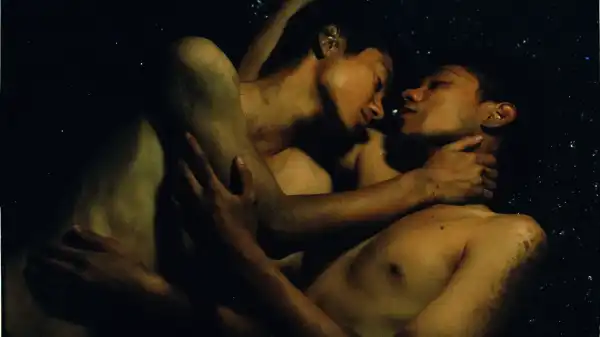
Save this storySave this storySave this storySave this story
Every good film is, in a way, a journey—an erasure of the distinctions between places and times. Watch enough of them, from around the world, and you can begin to think of them as the cheapest way to travel. Two of the most memorable cinematic road trips on the big screen right now are themselves imbued with a spirit of travel. Vietnamese writer-director Truong Minh Quy’s Viet & Nam travels from north to south before daring new horizons; Portuguese director Miguel Gomes’s The Grand Tour is an eccentric tale of cross-country travel. Though their tones, shapes, and rhythms differ greatly—The Grand Tour’s restlessly kinetic energy, Viet & Nam’s stately slowness—each is an invitation to lose yourself, blissfully, in their world.
Viet & Nam stars two gay men in their twenties who toil as miners in a northern Vietnamese village. They spend their days sweating in underground tunnels, digging for coal, and in their private moments, they make love with rapturous devotion. One of the most memorable shots is of Viet (Dao Duy Bao Dinh) and Nam (Pham Thanh Hai) wrapped in a filthy embrace, their bodies illuminated by the dim light of anthracite coal. You worry about their safety—even a small town should have cleaner, more comfortable places to meet—but Truong and cinematographer Son Doan transform this austere refuge into a tableau of precious beauty. The lovers may be hundreds of feet underground, but surrounded by a multitude of glittering points of light, they might as well be floating among the stars.
Viet & Nam is rife with such arresting permutations: dreams that initially and eerily mimic the texture of reality; characters whose identities become apparent only through strategic shifts in camera angle. Truong, who made two previous films (2019’s Tree House and the 2016 documentary City of Mirrors), cultivates an oneiric disorientation based, as the title suggests, on blurred analogies and divisions. Viet and Nam are in love but inseparable; Nam, yearning for a better life, dreams of leaving the country. The action takes place in 2001—at the outset, someone reports that planes have crashed into the World Trade Center—but the protagonists are psychologically stuck in an earlier time and tragedy.
In the dim, cave-like hut where Nam lives with his mother, Hoa (Nguyen Thi Nga), the television loudly announces the names of soldiers killed in the war in the 1970s whose remains have never been found. Among them is Nam’s father, who died fighting for the Viet Cong months before Nam was born. Hoa goes to sleep each night eagerly expecting to see her late husband in her dreams; she even keeps a diary of supposed messages from him about his final resting place. In search of him, Viet and Nam travel south with Hoa and veteran Ba (Le Viet Tung), who served with Nam’s father.
Viet and Nam is a series of excavations, and for all its gentle rhythms—a shot of jungle leaves rustling in the wind gives the story momentum—it seems to uncover new secrets and paradoxes every minute. In the mines, Viet and Nam dig with an intensity that will likely hasten their own deaths; but they also find a refuge where they can experience love and, therefore, life. In their search for Nam’s father, Nam and Hoa turn to a renowned psychic who specializes in finding the remains of soldiers. Her theatrics are certainly an elaborate hoax, but for many who have spent decades grieving, that may not matter. The psychic’s interventions seem to promise, through the power of suggestion, a cathartic degree of closure.
But is that enough? The sad, yearning look on Hoa’s face after the psychic relays her husband’s message doesn’t provide any clarity. We, in turn, must grapple with the remnants of a conflict that ended almost before he was born. In the south, he and his companions visit war museums and memorials; at one point, the group, digging at what Hoa believes may be her husband’s unmarked grave, finds an unexploded bomb. In another film, it might have exploded, but in Viet & Nam the discovery itself is shocking enough. The desire for closure unearths its opposite—a reminder that the horrors of war are not easily forgotten.
If the weight of the past weighs on Viet and Nam, the grim uncertainty of the future does the same. Truong drew inspiration from the 2019 tragedy when thirty-nine Vietnamese migrants were found
Sourse: newyorker.com